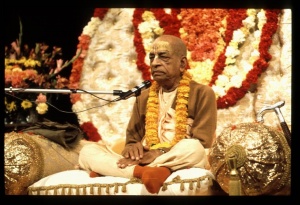CC Madhya 3.98 (1975): Difference between revisions
(Vanibot #0027: CCMirror - Mirror CC's 1996 edition to form a basis for 1975) |
(Vanibot #0020: VersionCompareLinker - added a link to the Version Compare feature) |
||
| Line 2: | Line 2: | ||
<div style="float:left">'''[[Sri Caitanya-caritamrta (1975)|Śrī Caitanya-caritāmṛta (1975)]] - [[CC Madhya (1975)|Madhya-līlā]] - [[CC Madhya 3 (1975)|Chapter 3: Lord Śrī Caitanya Mahāprabhu's Stay at the House of Advaita Acārya]]'''</div> | <div style="float:left">'''[[Sri Caitanya-caritamrta (1975)|Śrī Caitanya-caritāmṛta (1975)]] - [[CC Madhya (1975)|Madhya-līlā]] - [[CC Madhya 3 (1975)|Chapter 3: Lord Śrī Caitanya Mahāprabhu's Stay at the House of Advaita Acārya]]'''</div> | ||
<div style="float:right">[[File:Go-previous.png|link=CC Madhya 3.97 (1975)|Madhya-līlā 3.97]] '''[[CC Madhya 3.97 (1975)|Madhya-līlā 3.97]] - [[CC Madhya 3.99 (1975)|Madhya-līlā 3.99]]''' [[File:Go-next.png|link=CC Madhya 3.99 (1975)|Madhya-līlā 3.99]]</div> | <div style="float:right">[[File:Go-previous.png|link=CC Madhya 3.97 (1975)|Madhya-līlā 3.97]] '''[[CC Madhya 3.97 (1975)|Madhya-līlā 3.97]] - [[CC Madhya 3.99 (1975)|Madhya-līlā 3.99]]''' [[File:Go-next.png|link=CC Madhya 3.99 (1975)|Madhya-līlā 3.99]]</div> | ||
{{CompareVersions|CC|Madhya 3.98|CC 1975|CC 1996}} | |||
{{RandomImage}} | {{RandomImage}} | ||
==== TEXT 98 ==== | ==== TEXT 98 ==== | ||
| Line 11: | Line 10: | ||
<div class="verse"> | <div class="verse"> | ||
:āpanāra sama more karibāra tare | :āpanāra sama more karibāra tare | ||
:jhuṭhā dile, vipra | :jhuṭhā dile, vipra bali' bhaya nā karile | ||
</div> | </div> | ||
| Line 18: | Line 17: | ||
<div class="synonyms"> | <div class="synonyms"> | ||
āpanāra sama—like You; more—Me; karibāra tare—for making; jhuṭhā—remnants of food; dile—You have given; vipra | āpanāra sama—like You; more—Me; karibāra tare—for making; jhuṭhā—remnants of food; dile—You have given; vipra bali'-considering as a brāhmaṇa; bhaya—fear; nā karile—You did not do. | ||
</div> | </div> | ||
| Line 25: | Line 24: | ||
<div class="translation"> | <div class="translation"> | ||
"To make Me a madman like Yourself, You have thrown the remnants of Your food at Me. You did not even fear the fact that I am a brāhmaṇa." | |||
</div> | </div> | ||
| Line 32: | Line 31: | ||
<div class="purport"> | <div class="purport"> | ||
The words āpanāra sama indicate that Advaita Ācārya considered Himself to belong to the smārta-brāhmaṇas, and He considered Nityānanda Prabhu to be on the transcendental stage with pure Vaiṣṇavas. Lord Nityānanda gave Advaita Ācārya His remnants to situate Him on the same platform and make Him a pure unalloyed Vaiṣṇava or paramahaṁsa. Advaita | The words āpanāra sama indicate that Advaita Ācārya considered Himself to belong to the smārta-brāhmaṇas, and He considered Nityānanda Prabhu to be on the transcendental stage with pure Vaiṣṇavas. Lord Nityānanda gave Advaita Ācārya His remnants to situate Him on the same platform and make Him a pure unalloyed Vaiṣṇava or paramahaṁsa. Advaita Ācārya's statement indicates that a paramahaṁsa Vaiṣṇava is transcendentally situated. A pure Vaiṣṇava is not subject to the rules and regulations of the smārta-brāhmaṇas. That was the reason for Advaita Ācārya's stating, āpanāra sama more karibāra tare: "to raise Me to Your own standard." A pure Vaiṣṇava, or a person on the paramahaṁsa stage, accepts the remnants of food (mahā-prasāda) as spiritual. He does not consider it to be material or sense gratificatory. He accepts mahā-prasāda not as ordinary dāl and rice but as spiritual substance. To say nothing of the remnants of food left by a pure Vaiṣṇava, prasāda is never polluted even if it is touched by the mouth of a caṇḍāla. Indeed, it retains its spiritual value. Therefore by eating or touching such mahā-prasāda, a brāhmaṇa is not degraded. There is no question of being polluted by touching the remnants of such food. Actually, by eating such mahā-prasāda, one is freed from all the contaminations of the material condition. That is the verdict of the śāstra. | ||
</div> | </div> | ||
Latest revision as of 17:23, 27 January 2020

A.C. Bhaktivedanta Swami Prabhupada
TEXT 98
- āpanāra sama more karibāra tare
- jhuṭhā dile, vipra bali' bhaya nā karile
SYNONYMS
āpanāra sama—like You; more—Me; karibāra tare—for making; jhuṭhā—remnants of food; dile—You have given; vipra bali'-considering as a brāhmaṇa; bhaya—fear; nā karile—You did not do.
TRANSLATION
"To make Me a madman like Yourself, You have thrown the remnants of Your food at Me. You did not even fear the fact that I am a brāhmaṇa."
PURPORT
The words āpanāra sama indicate that Advaita Ācārya considered Himself to belong to the smārta-brāhmaṇas, and He considered Nityānanda Prabhu to be on the transcendental stage with pure Vaiṣṇavas. Lord Nityānanda gave Advaita Ācārya His remnants to situate Him on the same platform and make Him a pure unalloyed Vaiṣṇava or paramahaṁsa. Advaita Ācārya's statement indicates that a paramahaṁsa Vaiṣṇava is transcendentally situated. A pure Vaiṣṇava is not subject to the rules and regulations of the smārta-brāhmaṇas. That was the reason for Advaita Ācārya's stating, āpanāra sama more karibāra tare: "to raise Me to Your own standard." A pure Vaiṣṇava, or a person on the paramahaṁsa stage, accepts the remnants of food (mahā-prasāda) as spiritual. He does not consider it to be material or sense gratificatory. He accepts mahā-prasāda not as ordinary dāl and rice but as spiritual substance. To say nothing of the remnants of food left by a pure Vaiṣṇava, prasāda is never polluted even if it is touched by the mouth of a caṇḍāla. Indeed, it retains its spiritual value. Therefore by eating or touching such mahā-prasāda, a brāhmaṇa is not degraded. There is no question of being polluted by touching the remnants of such food. Actually, by eating such mahā-prasāda, one is freed from all the contaminations of the material condition. That is the verdict of the śāstra.